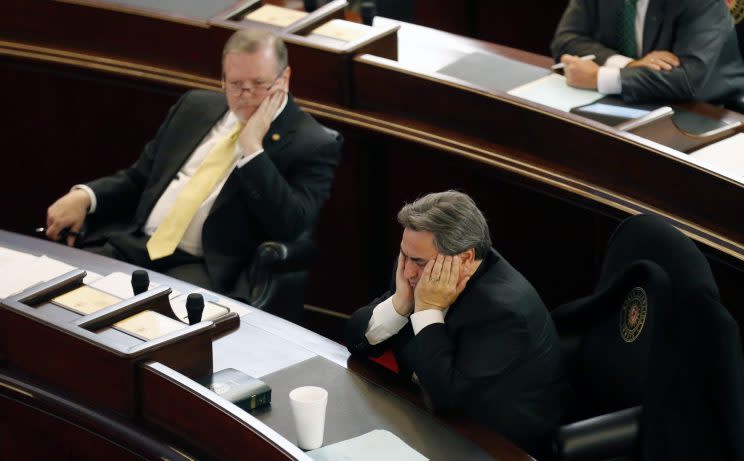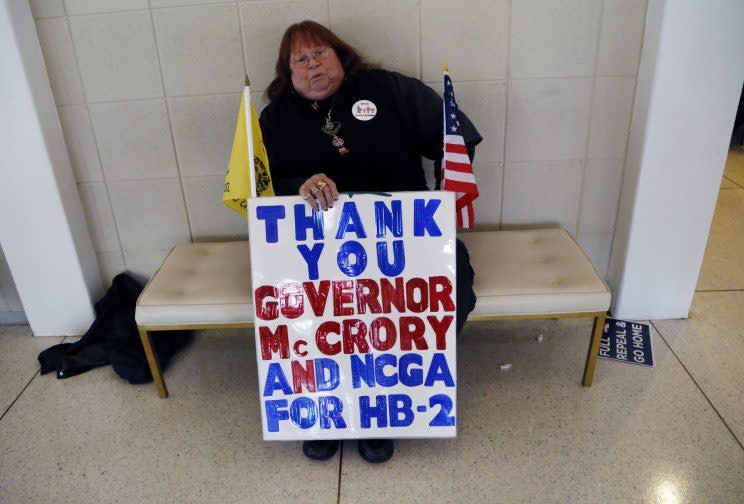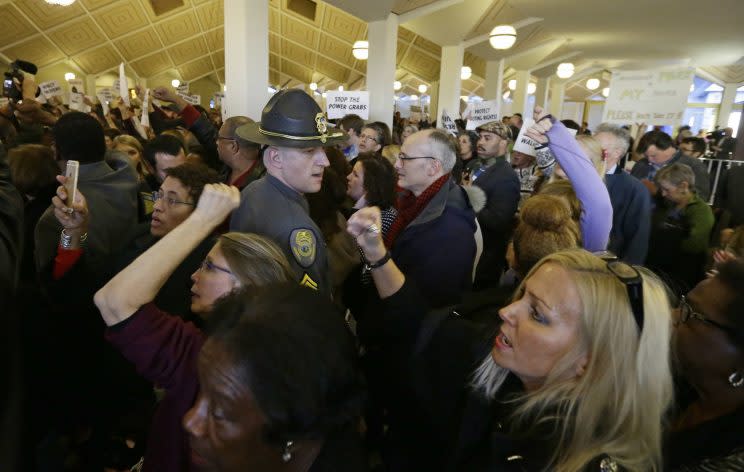Why did North Carolina’s deal to repeal HB2 come undone?

A deal to scrap House Bill 2 (HB2), the “bathroom bill” that’s caused tremendous tension in the Tar Heel State, fell apart Wednesday night in a raucous special session where state legislators hurled recriminations at each other — a microcosm of the state’s deeply divided politics.
For North Carolina’s pro-LGBT contingent, the standoff kicked off a winter of discontent. For their opponents, it was a Christmas miracle.
What’s at stake?
HB2, which passed in March, eliminates local antidiscrimination protections for gay and transgender people and legislates that people must use bathrooms that match their biological sex as indicated on their birth certificate. It has been variously described as “common sense” and “hateful.”
The bill ignited widespread outrage and rekindled a national debate about transgender bathroom policy. Though that element got the most attention, even seeping into presidential campaigns, the heart of the matter is where religious beliefs and LGBT rights clash.
Conservative lawmakers created HB2 in response to Charlotte’s nondiscrimination ordinance, which they considered an instance of governmental overreach. In February, the Charlotte City Council approved amendments that prohibited discrimination based on sexual orientation, gender expression and gender identity (race, religion and national origin were already protected categories).

The deal
Republican leadership in the state’s General Assembly had struck a deal with Democratic Gov.-elect Roy Cooper to repeal HB2 in exchange for rescinding a nondiscrimination ordinance in Charlotte, the state’s largest city.
The Charlotte City Council on Monday rolled back certain protections it had passed in February that, among other things, affirmed the rights of transgender individuals to use whichever public restroom they felt best aligned with their gender identity. LGBT advocates were troubled that this progressive ordinance would be sacrificed, but mostly considered the repeal of HB2 to be a bigger win.
But it was only a partial rollback and Republicans immediately argued that Charlotte didn’t go far enough. They wanted all of the protections from February to be eliminated.
On Wednesday, the Charlotte City Council voted 7-2 to remove “all aspects of the original ordinance” that remained.
“The City Council acted in good faith to do everything that it understood was necessary to facilitate the repeal of HBC,” the city of Charlotte said in a statement.

The dispute
After a few days of relative goodwill, the General Assembly gathered for its fifth special session of 2016 on Wednesday, roughly nine months after HB2 was passed. The law has severely damaged the state’s reputation. It led major companies to close offices, entertainers to cancel concerts and sports leagues to move major events to other states — all sapping the Tar Heel State of economic opportunities.
Thanks to HB2 backlash, North Carolina lost out on PayPal and Deutsche Bank expansions, Ringo Starr and Bruce Springsteen concerts, NCAA championship games and much more. It reportedly cost the state nearly $400 million.
Nevertheless, lawmakers ultimately could not come to an agreement after a day of heated debates and deliberations Wednesday. Republicans pushed for a months-long freeze on cities from passing laws that protect transgender people against discrimination and Democrats balked, arguing that this stipulation would amount to only a limited appeal and that anti-LGBT discrimination would still be baked into North Carolina’s law.
Distrust of Republicans
The fiasco does not help to quell the bad blood between the incoming Democratic governor and the Republican-led legislature.
Cooper, who had refused to enforce HB2 and actively campaigned against it as attorney general, narrowly defeated incumbent Gov. Pat McCrory in a recent, bitter gubernatorial race. He had brokered the aforementioned deal between state lawmakers and Charlotte’s city council.

“I know there were enough Democratic and Republican votes in the House and in the Senate to fully repeal House Bill 2 if they had just been given a chance, but Republican legislative leaders have broken their word to me and they have broken their trust with the people of North Carolina,” he said at a press conference Wednesday night.
According to Cooper, the last-minute additions Republicans tried to shoehorn into the deal would not successfully appease the corporate and political interests currently boycotting the state.
“What they’ve been saying all along is they wanted Charlotte to repeal its ordinance first. That’s what they’ve said,” Cooper continued. “That is what they said in public. That is what they said to me. I looked them in the eye. That’s what they said.”
The City of Charlotte released a statement expressing disappointment in the “unfortunate outcome” and reaffirmed its commitment to protecting the city’s “diverse and inclusive communities.”
Distrust of Democrats
Republican Senate leader Phil Berger, on the other hand, says responsibility for the failed deal falls squarely on Cooper and Charlotte Mayor Jennifer Roberts. He accused them of acting in bad faith by only partially repealing the Charlotte ordinance at first. He was also aggrieved that the GOP leaders’ request for “a cooling-off period” on “radical bathroom sharing ordinances” was rejected outright.
“Make no mistake: Roy Cooper and Senate Democrats killed the repeal of HB2, abandoning Roy Cooper’s commitment to avoid divisive social issues by shooting down a temporary cooling off period on ordinances like the one that got us into this mess last March,” Berger said in a statement. “Their action proves they only wanted a repeal in order to force radical social engineering and shared bathrooms across North Carolina, at the expense of our state’s families, our reputation and our economy.”

Outgoing Gov. McCrory characterized the entire controversy as a “manufactured political issue” cooked up by deep-pocketed, radical left-wing groups to target Charlotte and North Carolina. In a statement, he accused the left of sabotaging bipartisan good faith.
“As I’ve stated multiple times, the balance between privacy and equality is not just a North Carolina issue, it is a national issue that will be resolved by the U.S. Supreme Court in the near future,” he said. “North Carolina will continue to be one of the nation’s leaders in job growth, education, quality of life and equality for all of our citizens.”
Reaction from LGBT advocates
The Human Rights Campaign (HRC), Equality North Carolina and the National Center for Transgender Equality all released statements condemning the GOP legislators for failing to keep their word and clinging to “hateful, anti-LGBTQ provisions.”
HRC president Chad Griffin accused Sen. Berger and Speaker Tim Moore of betraying the public trust and sending a clear message that North Carolina is “closed for business.”
“Their shameful actions and broken promises subject LGBTQ North Carolinians to state-mandated discrimination, contribute to a heightened environment of harassment and violence, and will continue the significant harm done to the state’s reputation and economy,” he said in a statement. “It’s clear today that the GOP leadership’s cruelty towards lesbian, gay, bisexual and particularly transgender North Carolinians knows no bounds. For our part, we will continue to fight to defeat all of HB2 and protect North Carolinians no matter what it takes.”

Reaction from HB2 supporters
The North Carolina Family Policy Council (NCFPC), a nonprofit dedicated to the preservation of traditional family values, has been outspoken in its support of HB2. It has argued repeatedly that HB2 puts women and girls at risk of sexual predators because it allows full-grown “men” to enter their spaces. Many prominent Republican politicians, such as former presidential candidate and Texas Sen. Ted Cruz, share this sentiment.
NCFPC was exuberant that the special session adjourned without rescinding the law, after four days of rumors and reports to the contrary. Afterward, the council published a blog post titled “Special Session Ends With HB2 Intact!”
“We are grateful to all the good people of North Carolina who spoke out on this issue this week and who prayed for their legislators throughout the day,” NCFPC president John L. Rustin said in a statement. “We applaud the members of the NC General Assembly who continued to stand strong in defense of safety, privacy and dignity of all of our citizens.”


